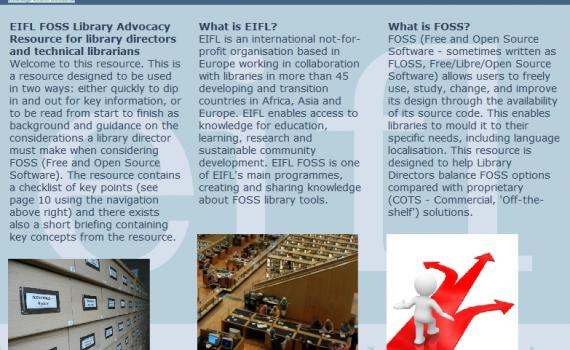
ABOUT THE RESOURCE
FOSS (Free and Open Source Software - sometimes written as FLOSS, Free/Libre/Open Source Software) allows users to freely use, study, change, and improve its design through the availability of its source code. This enables libraries to mould it to their specific needs, including language localisation.
Feedback from the EIFL library community suggested that one of the key barriers to a greater number of FOSS deployments was a lack of effective advocacy guidance. In response to this, the EIFL-FOSS programme created a FOSS Advocacy Resource. It is aimed at both:
-
Library directors, who need to be aware of all of the costs and benefits in order to make a decision on deploying a FOSS tool, or to advocate for that decision to be made by institutional managers;
-
Librarians and technicians, who need to express the right kinds of information to the library directors to effectively make the case for FOSS.
The resource includes a brief overview and rationale for using FOSS; and links to more information about major library FOSS tools. It also includes an extensive analysis of two key considerations when deciding to implement a FOSS solution: 1) total cost of ownership (TCO) and 2) intangible costs/benefits. The resource is designed so that you can easily skim through the major headings if you have little time available, and you can also drill down into more detailed information if you want to find out more.
Library Software Costs Comparison Worksheet
To help with decision-making, a Library Software Costs Comparison Worksheet is provided that will help to objectively compare COTS (Commercial, Off The Shelf) software with FOSS software. The worksheet should be used in context with the Advocacy Resource to set it into context. The worksheet has been made a downloadable resource to enable users to print it out and complete it with their own data.
- Download the worksheet in PDF format
Offline access
If accessing the resource online (vle.jisctechdis.ac.uk/xerte/play_109) is not ideal for you, it is possible to download the resource and view it offline - it works in any browser just the same as it would online. Here are the steps to take:
-
Download the Zip file of the resource (5.4 MB)
-
Open the Zip file (if you do not have an unzipping tool you may need to download and install a free unzipping tool such as 7Zip)
-
Extract All of the contents into a folder on your computer
-
Open the file named index.htm - the resource should then display in a browser on your computer while offline.

SHARE / PRINT









